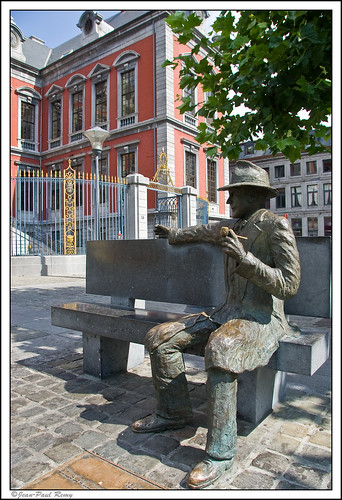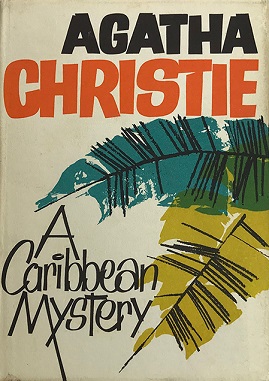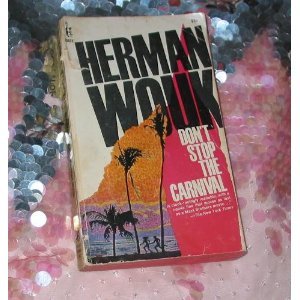 A fairly recent post by Dale Andrews, concerning ghost stories, set me to thinking about the differences between ghost stories and mysteries.
A fairly recent post by Dale Andrews, concerning ghost stories, set me to thinking about the differences between ghost stories and mysteries.In that post, Dale mentioned:
. . . British ghost story writer M.R. James identified five key features of the classical English ghost story:
1. The pretense of truth
2. “A pleasing terror”
3. No gratuitous bloodshed or sex
4. No ‘explanation of the machinery’
5. Setting: “those of the writer’s (and reader’s) own day”
(Dale listed these features by bullet point, but I’ve numbered them for ease of reference in further discussion.)
Looking at that list, it seems to me it very nearly fits most Agatha Christie novels I’ve read.
 |
| The Great Agatha Christie |
Explaining the machinery – letting the reader know not only who dunnit, but sometimes also how the murder or mayhem was performed, along with an explanation concerning any special steps of intentional misdirection – is, to me, an inherent part of a mystery story.
Christie’s plots certainly reveled in this, it seems to me.
Rather Nicely, Too.
Sometimes, solving the crime meant figuring out, and potentially reconstructing, some Rube-Goldberg Machine the murderer had set up, in order to carry out the crime (or to make it seem as if the crime had been committed) in a way, or at a time, which would rule-out the murderer as a suspect. Ferreting out the contraption’s construction, from the few clues left lying around, was central to determining how and why the victim was killed – as well as the murderer’s identity.
When I was a kid, my father was a great lover of Agatha Christie stories. I think that, being an engineer, he loved the intricate detail of her plots, and all the little pieces of them. Each piece ticking-over machine-like – moving on its own, yet interconnected, its function interdependent on the movement of all the others, to produce the desired outcome. All those little whirring components formed a symphony of complex simplicity, seemingly tailor-made for an engineer’s pleasure.
 |
| The "Doctor" who made the Christie statement. |
 |
| Some of Dr. Who's faces. |
Perhaps this is also why Dr. Who (the title character in the BBC Sci-Fi series Dr. Who), in one episode, reveals that Agatha Christie is inarguably considered the greatest writer of all time -- throughout the entire universe!

An ‘explanation of the machinery’, however, does not seem limited to cozies.
Bloodshed and sex may abound in hard-boiled mystery or suspense stories. And, the clues are different, many of them far less tangible than those in the average cozy. In fact, the protagonist sometimes seems to be more psychologist than detective, by the time s/he’s tumbled to the truth – often through a sudden and intuitive leap of understanding. Yet, a final explanation of the evil mechanism afoot still seems to be needed if I’m to walk away satisfied in the end.
A ghost story can plausibly leave the ghost fully clothed and unexamined. A mystery, however, (for me, at least) seems to require some final revelation of the machinery behind the ghost.
I hadn’t consciously realized this until I read Dale’s post, though my subconscious evidently knew it all along.
Questions About Some Stories
A while ago, I read an anthology of noir mystery stories, but found myself unhappy with the collection. Many of them didn’t seem properly finished. The clues were all there, and I was quite sure I’d figured out what had happened in each story, but then they stopped.
Each of those particular stories stopped short, as if they’d been writing assignments for a literary class that stressed the importance of letting the reader decide the outcome of the piece. I often appreciate such endings in literary stories, and many of these stories felt quite literary in nature. By and large, they were well written and engaging, yet I found myself left with a sense of disappointment after turning the last page. And I wasn’t quite sure why.
I knew I was disappointed that the endings weren’t traditionally “wrapped up.” But, was this lack of “wrap up” a real problem, or just a problem of my perception. Was my disappointment rooted in lack of the familiar, or was an important ingredient missing from these stories?
 I considered the problem for a few days, on and off, then – as I’m wont to do when I encounter a relatively unimportant, yet protracted, problem – I set it aside, to let my mind work on it in my absence, in the hopes I’d eventually bump into something that would jar loose a solution.
I considered the problem for a few days, on and off, then – as I’m wont to do when I encounter a relatively unimportant, yet protracted, problem – I set it aside, to let my mind work on it in my absence, in the hopes I’d eventually bump into something that would jar loose a solution.And, Dale’s post proved to be just the jarring “something” I needed.
When I hit the list reproduced above, the parallels to Christie seemed to jump out at me. My mind instantly leapt to those Christie stories, I'd read, in which explaining who dunnit actually did require an explanation of the machinery used to do the deed. And, I realized: The reason I’d been disappointed by the stories that didn’t include the “wrap-up” was because the game I traditionally enjoy, when it comes to reading mysteries – that of matching wits with the writer, and discovering whether or not I’d come up with his/her intended scenario – was denied me.
Looking Through Another’s Eyes
Since my mom fell ill about two years ago, I stumbled across the joy of working the daily crosswords in the Arizona Republic newspaper. I enjoy these crosswords because they provide me the chance to consider how others see words. (Interestingly, the flip-side of this, is the same reason why I hated crosswords when I was younger.)
 The definitions, or clues often are not ones I would choose, if I’d written the puzzle. I don’t think of these words the way the crossword writers do. In this past Tuesday’s United King Feature Syndicate Crossword puzzle, for instance, the clue “Sudden Silence” was meant to provoke the answer “Hush”. But, if my 9-year-old asked me if “hush” meant “sudden silence,” I would have to tell him: “No. Not necessarily. A hush isn’t always the cessation of noise; sometimes it’s the long absence of noise, a deep quite like the one you might encounter out in the middle of the empty desert on a Summer day.”
The definitions, or clues often are not ones I would choose, if I’d written the puzzle. I don’t think of these words the way the crossword writers do. In this past Tuesday’s United King Feature Syndicate Crossword puzzle, for instance, the clue “Sudden Silence” was meant to provoke the answer “Hush”. But, if my 9-year-old asked me if “hush” meant “sudden silence,” I would have to tell him: “No. Not necessarily. A hush isn’t always the cessation of noise; sometimes it’s the long absence of noise, a deep quite like the one you might encounter out in the middle of the empty desert on a Summer day.”In the same puzzle, the word “Benchmark” was meant to evoke the answer “Norm.” I have a background in Engineering from my days in the army, however, so to me, a “Benchmark” is a small concrete square with a steel cap in it, which has a cross-hatch I can place a transit over, and “shoot from” in order to conduct surveying from a “known point” on the earth.
On the other hand, when I saw the clue “Benchmark” I also noticed that the answer could only be four letters long and ended in an “M”, (since I’d already written a word that crossed through the last box of the answer space). Rethinking my mental list of definitions for “Benchmark” I considered the word “Standard,” which of course did not fit .
My choice of "Standard" over "Norm" was based on my personal experience with those two words. A benchmark, in my experience, is a standard that is set for others to achieve, if they are to be considered “good” at something, while the “Norm” is the level of success most people achieve at a given task (hence it’s the “NORMal score” on a test for example). I’m not saying “norm” is an invalid definition for “benchmark”. I’m saying it’s not how I think of the word.
And, That’s The Point.
Dale’s post led me to conclude that the joy I derive from working crosswords is similar to the joy I get out of reading a mystery.
In both cases, I find myself “matching wits” with the person who constructed the thing. In the case of the crossword, I enjoy trying to figuratively climb inside another person’s mind, and consider the clues through his/her eyes. Reading a mystery, I’m trying to figure out “who dunnit” before the writer tells me. In an action-adventure piece, I’m trying to figure the protagonist’s way out of the maze s/he finds him/herself caught in. And, I’ll admit it, I sometimes decide my solution to the mystery or maze in a story is better than the writer’s.
But, here’s the thing: In all three cases, my satisfaction is dependent on being able to match my solution against that of the creator of the work in question. If, at the end of the story, the writer or creator fails to let me know what s/he sees as the “book solution,” then I’m left feeling unfulfilled.
I get this same feeling if I miss picking up a paper, and checking the crossword solution on the following day. Because, I’m being deprived of the chance to compare solutions. Was I right or wrong in my estimation of what this creator was thinking? How did this other person see the clues and answers? I think my answers were the right ones, but I can’t know unless s/he lets me know.
And, that’s the problem I had with those stories. When the authors decided to cut them off before concretely explaining the machinery behind the chicanery, I was left without an answer key. This didn’t keep me from coming up with a solution (and sometimes more than one), but it did leave me feeling somewhat cheated.
I felt like a kid who completes the PSAT, then realizes he’s sitting in the auditorium all alone. He’s got the test done. He thinks he’s done a pretty good job of answering the questions correctly. But, there’s no one there to confirm this. He can’t really know if he got those answers right or not. And, it’s the Practice SAT, so his answers don’t really matter to anyone else. But, he’d sure like to know. Instead, however, he’s left in an empty room calling, “Hello . . . ? Hellooo . . . ? Hey, is anybody out there???”
That’s a lonely feeling, indeed.
And the person who takes a PSAT that never gets graded is very apt to feel just as disappointed as I felt when I finished those stories that denied me a glimpse of the writer’s-viewpoint solution.
Ghost Story Redux
All this, coupled with the Halloween timeframe of Dale’s post, reminds me of a friend of my dad's. This guy happened to be a Hydrostatic Engineer, a person who spent his time studying the dynamics of fluid flow, an important subject if you’re designing something that you’d rather was not swept away by the runoff of a heavy downpour. So, he was often posted to construction areas around his state for several weeks at a time.
 One night, this guy was driving down a narrow lane cut through a dense forest. Locals claimed the area was "haunted,” and refused to walk this particular stretch of road at night. He’d driven the road at night several times, while in the area, but never when it was so windy. Gusts blew the tree limbs around, and he had just decided to leave his lane and drive more closely to the crown of the otherwise empty road, to avoid them, when a spectral image -- grayish-white but transparent -- slipped from the woods and flitted across the road in front of his car.
One night, this guy was driving down a narrow lane cut through a dense forest. Locals claimed the area was "haunted,” and refused to walk this particular stretch of road at night. He’d driven the road at night several times, while in the area, but never when it was so windy. Gusts blew the tree limbs around, and he had just decided to leave his lane and drive more closely to the crown of the otherwise empty road, to avoid them, when a spectral image -- grayish-white but transparent -- slipped from the woods and flitted across the road in front of his car.The wraith floated above the pavement, writhing as it slipped past, through his headlights, arms and legs seeming to protrude then recede back into it’s body -- amoeba-like -- as if it were in pain, or searching. And, all along, he could see the lane markers of the road on the other side of the thing.
The guy was shaken, but absolutely sure ghosts didn't exist, so he stopped. backed up until he reached the spot he thought the wraith had come from, then parked and walked into the woods to find out what was going on. About twenty feet in, he ran across a place where a small brook dropped several feet into a narrow area. The frothing water built a layer of foam on top of itself, because of the force.
As I said, it was a breezy night, and when the next breeze came along, it blew a clump of foam off the top and out to the road. The guy chased it, but couldn't move as fast as the blowing foam. When it crossed the road, he was still in the edge of the woods. An approaching car squealed and swerved to miss it, then someone inside yelled, "I told you this road was haunted!"
Is this a ghost story? Perhaps for those people in the car. But for us? My opinion: No. It’s a mystery story. The machinery behind the ghost was explained. Case closed.
One last thought.
If leaving the ghost unexplained results in a ghost story. And explaining the machinery behind the ghost makes it a mystery story. What’s a story that reveals the ghost inside the machine? Science Fiction? Horror? What do you think?
Or, for that matter, do you think that all this talk of matching wits is really pretty witless?
See you in two weeks!
—Dixon





















